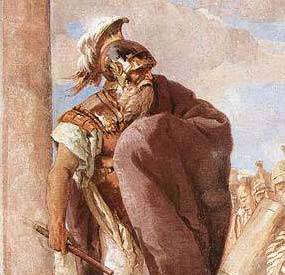Calchas
The legendary siege of Troy by the Greek forces in the Trojan War is now best known through the work of Homer in his Iliad. The fighting and intrigue surrounding the forces of Troy and the Greeks has entertained countless readers for hundreds of years. The Greek heroes, including the likes of Achilles, Odysseus and Agamemnon amongst their ranks, than their Trojan counterparts, but the Trojan War was not all about the heroes. Within the Greek camp was also a man called Calchas; neither a hero nor fighter, Calchas was pivotal to the success of the Greeks.
Calchas was a soothsayer, the son of Thestor, and great-grandson of the Greek god Apollo. Calchas had been blessed with the ability to predict the future accurately and would be believed, unlike Cassandra. These predictions were mostly undertaken through the observations of birds and wildlife around him.
Calchas’ role within the Trojan War began even before the Greek fleet had set sail, with Calchas predicting that the war would only end in the tenth year of hostilities; although this in no way put off the Greeks.
It was also Calchas who advised Agamemnon, Greek king and leader of the Greek forces, that victory against Troy could only be achieved with Achilles, the demi-god, amongst their rank. A search ensued, with the Greek hero eventually located and recruited.
Still though it was not time to set sail for Troy, and as well as confirming the route to take, Calchas also persuaded Agamemnon that only through the sacrifice of his fairest daughter to Artemis could the Greek fleet be assured of favourable winds. It was a sacrifice to which Agamemnon agreed, something that had deadly results upon his own return from Troy.
When Troy was reached the importance of Calchas was not diminished, and it was Calchas who was consulted about many of the most important military decisions. Indeed it was Calchas who would proclaim that Odysseus’ idea for a wooden horse would be ultimately successful. Prior to this Calchas had also been the man to save the Greek forces from a plague sent by Apollo.
Apollo had sent the plague as a result of Agamemnon enslaving Chryseis, a Trojan woman and daughter of Chryses, a priest of Apollo, with no thought of ransom. It was only through the intervention of Calchas and the releasing of Chryseis that the plague was lifted.
During the period of the Trojan War there is often confusion about which predictions are made by Calchas, and which are made by the Trojan seer, Helenus, brother of Hector.
A prophecy had also been made about the demise of Calchas himself, with it being said his death would come when he met a seer with greater skill than himself. The manner of his death often varies depending upon the source being read.
In one story, death is said to have come to Calchas at Colophon, when he came upon Mopsus within the grove of Apollo. The general consensus is that Mopsus bested him in a prediction, either about the number of figs on a tree or the number of piglets a sow would give birth to. Upon being bested Calchas is said to die from disappointment.
Another story tells of Calchas dying from laughter when it seemed that a prophecy about being unable to drink wine he had made was doomed to failure.
The name of Calchas is all but forgotten today, whilst the names of his contemporaries live on. In ancient Greece though, Calchas was as an important figure, and regarded as highly as many of the greatest heroes.
[1]













